324:quasi-journalistic things
Hullo
Theology
Double Image 2
Links
Bye
****
It’s a five week issue schedule, which means a slightly longer gap before people need to get their pre-orders in for The Power Fantasy #8. So now’s the time to make sure your retailer knows you want a copy. It’s the Second Summer of Love Part 2, and you want it. It’s Eliza Hellbound. It’s the Pyramid’s fall. It’s full of bangers.
And so, I’ve done a teaser again.
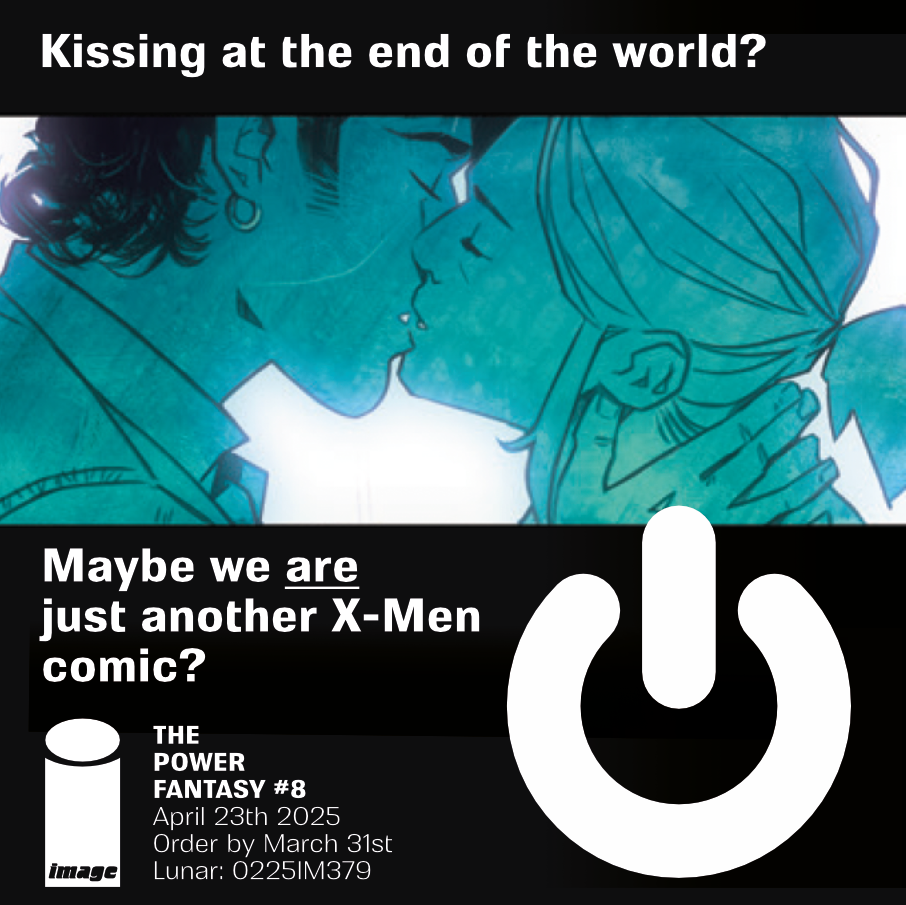
Frankly, me messing around with Affinity Designer is some of the most fun I have in comics, so I made five teasers, and am now gleefully frustrated I can’t post them all. That would be too much.
But posting two in advance, and one on release? That sounds reasonable.
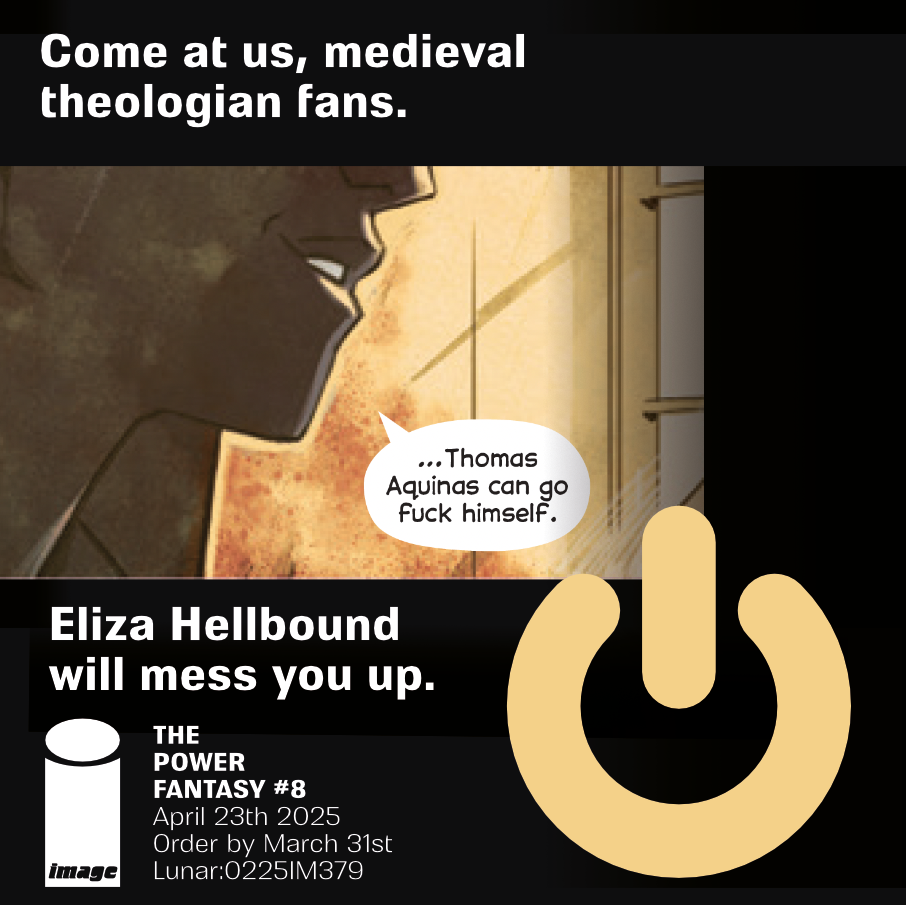
Here’s the covers again, one from Caspar and one from Dani.
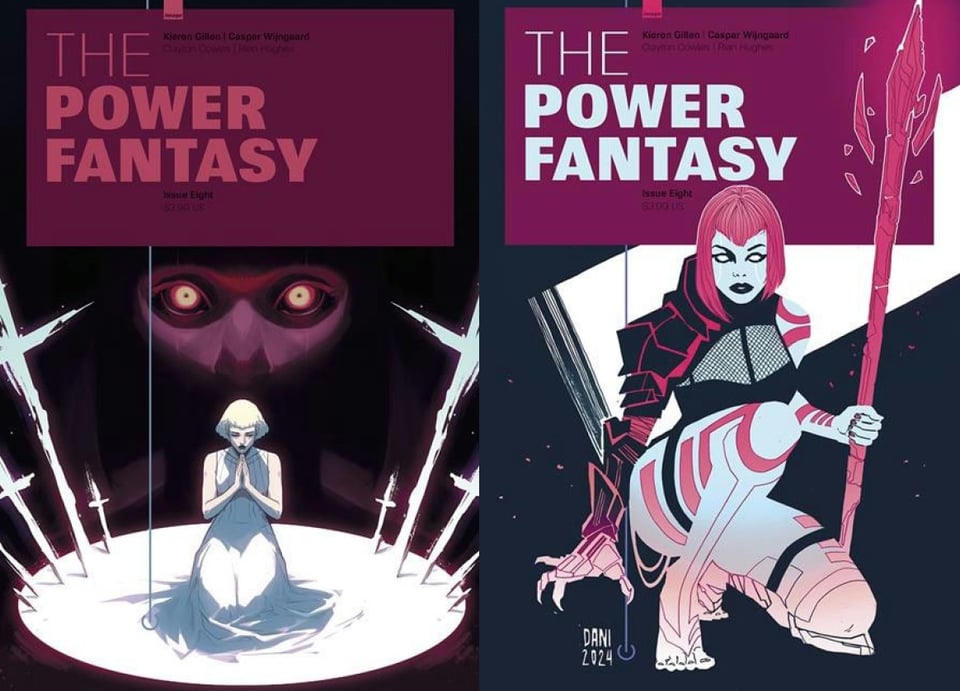
If your retailer wants a Lunar code, it’s 0225IM379.
I was chatting about community in indie books this week and thinking about how groups of folks who are talking about it issue by issue have grew up, and how that may germinate more in future. Like most my stuff, I’ve written it to be able to be appreciated however you pick up, but I’m very aware that the month-to-month is a different kind of thrill than any other, and it’s one you can only get once – seeing it reveal itself, month by month.
To which I’m saying: yeah, if you have a nose at anything in that thread and think it sounds fun, you should consider jumping aboard.
If this all is new to your, the Power Fantasy primer will fill you in.
****
DOUBLE IMAGE: FREE PLANET
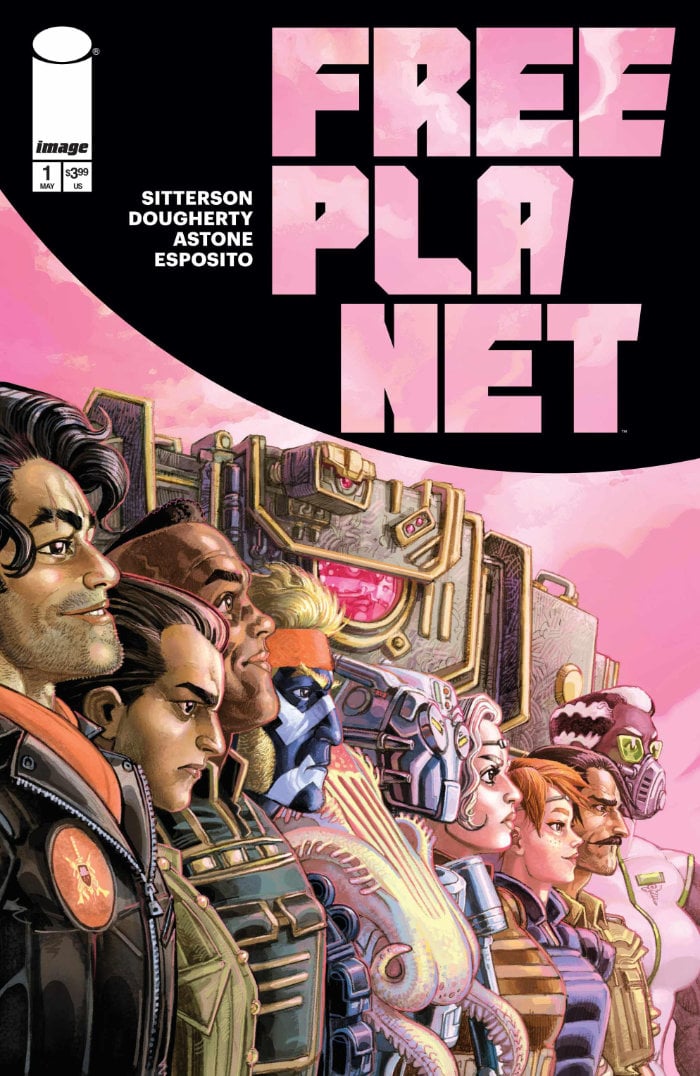
DOUBLE IMAGE: FREE PLANET
Free Planet is the new ongoing comic from Aubrey Sitterson and Jed Dougherty, a dense political comic about the first free planet in the universe, the powers that attempt to crush it and what the hell “Freedom” means anyway. It’s out in May, but as we approach pre-orders, it’s a good time to talk with Aubrey and the book and their plans. It’s dense, heady stuff – when reading it I found myself thinking a 40k take on the space of Firefly with better leftist credentials. I mean both in ideas, tex and visuals – Aubrey references Chaykin in terms of the approach to the page, and I can see it.
Shamefully - excuse me, covid and a 3 year old - but the last thing I read you wrote was Tyrell Cannon and you doing BEEF BROS, the berserk leftist himbo of a comic about berserk leftist himbos. Free Planet is not a berserk leftist himbo of a comic. Free Planet is a big, dense, sci-fi political epic. You contain multitudes. How do you navigate your interests?
I'm thrilled that the distinction is so clear, as Free Planet is an enormous swing for me. I've always been interested in what I see as the three core components of Free Planet: explosive action, a fleshed-out but merely hinted-at larger world, and intense interpersonal drama. What's changed is my approach. After a big 2021, with a lot of books out, I took several steps back to rethink how I wrote comics, largely based on how my work – despite my abiding confidence in its execution – never garnered the type of reaction prompted by the comics of smart, cerebral, thoughtful writers like, well...you.
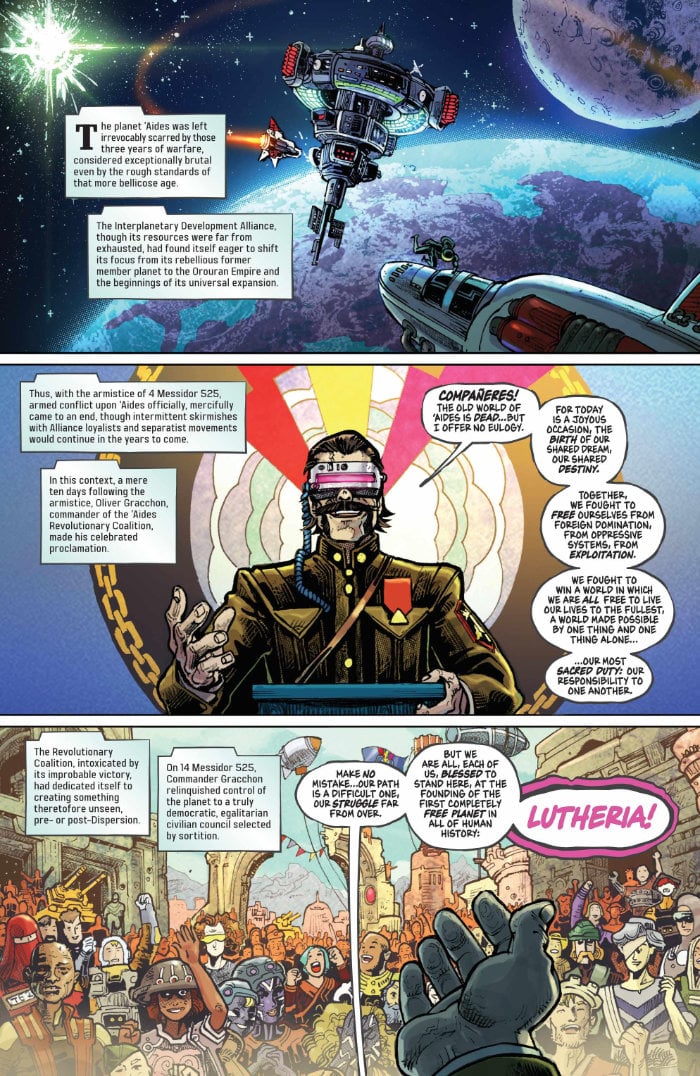
The thing that most struck me about Free Planet was its density, at every level. It does a lot of worldbuilding, it introduces a lot of characters, it uses a lot of text, it keeps its scenes short to include a lot. Hell, even Jed's art style, for all its cartoon playfulness, is dense in detail. It seems a book which is demanding the reader stop, slow down, and pay attention. That's a confident move. What's your goals?
Free Planet was designed, from the ground up, to function as both literature and art object. I feel strongly that the thing that constitutes both is being worthy and rewarding of rumination. There's no decompression in Free Planet; it's a hyperconcentrated blast of everything that interests Jed and me. We approached every spread with the imperative of creating something visually overwhelming, rich in information presented visually, achieved through a Chaykinian approach to page design. It's not merely a series of scenes; it's a world in which to lose yourself. A comparison I know will scratch you where you itch: It's story and sourcebook.
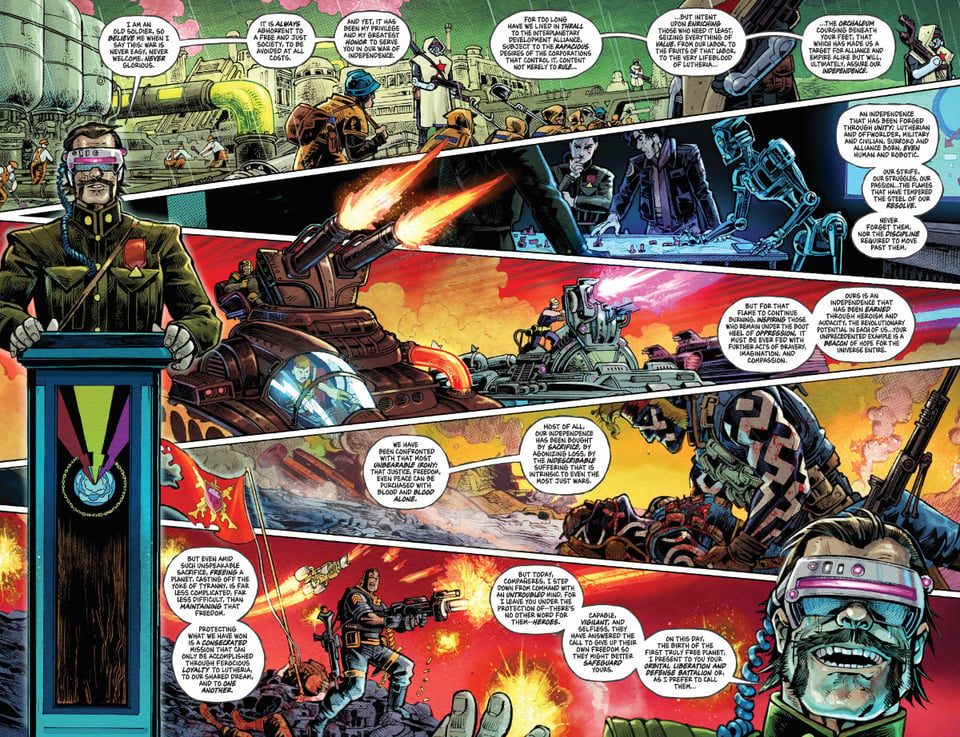
It's also an explicitly political book - the story of the one free planet in the universe, and what happens next. While it's true all books are political, especially in the world we're in right now, this is a book which front loads it... but it doesn't read like playful agitprop like BEEF BROS. This is a story of people. How do you balance all of these aspects to the book?
Most explicitly political work falls into one of two categories: Unabashed propaganda like BEEF BROS or direct metaphor. Both can be harnessed for useful ends but – to my eye – neither exhibit the richness of true literature, which is rooted in ambiguity, complexity and the reader interpretation it prompts. You and I have discussed my deep admiration of Aldous Huxley, particularly Point Counter Point and Island. The inspiration I took from those works is the assignation of fully developed worldviews to each character, such that there's a convergence of the political, personal and philosophical, with political maneuvering and personal conflict both informing one another.
Jed's art is something else. As said above, it's dense, but also bold. What's your collaboration process like? When developing my own work, I know it doesn't really exist until an artist agrees to work on it - that transforms its specific nature entirely. Do you think that's true? And if so, how does Jed's perspective and specific execution shape the comic?
First: Jed excels at absolutely every aspect of comics; it's a damning indictment of the industry that he's not a humongous star. If there's any justice in the world, Free Planet will remedy that.
I agree with your view on comics; good comics, at least, those made with deliberate intention and an eye toward a holistic effect. I first met Jed when he was working as one of my uncle Howard Chaykin's assistants and you can see that influence in our use of design and layout as narrative tools. There are two additional things that set Jed apart, however. The first is the fact that he can do anything; whether it's integrating charts, graphs, diagrams, maps and infographics into the pages themselves or lifting techniques from 70s bande dessinée, 80s manga or 90s Image comics, I've yet to find something Jed can't do. The second is Jed's insistence on fully considered verisimilitude. When working on Savage Hearts, I was shamed when he asked for specifics about the flora and fauna of the world we had created and I didn't have an answer. Developing Free Planet became a game of oneupmanship, with us both attempting to outdo one another, me through my extensive research into real-world revolutions and civil wars, and him through exhaustive and exhausting design work for every ethnicity, planet and confederation of planets, all of which informed our worldbuilding, narrative and character arcs at every step of the way.
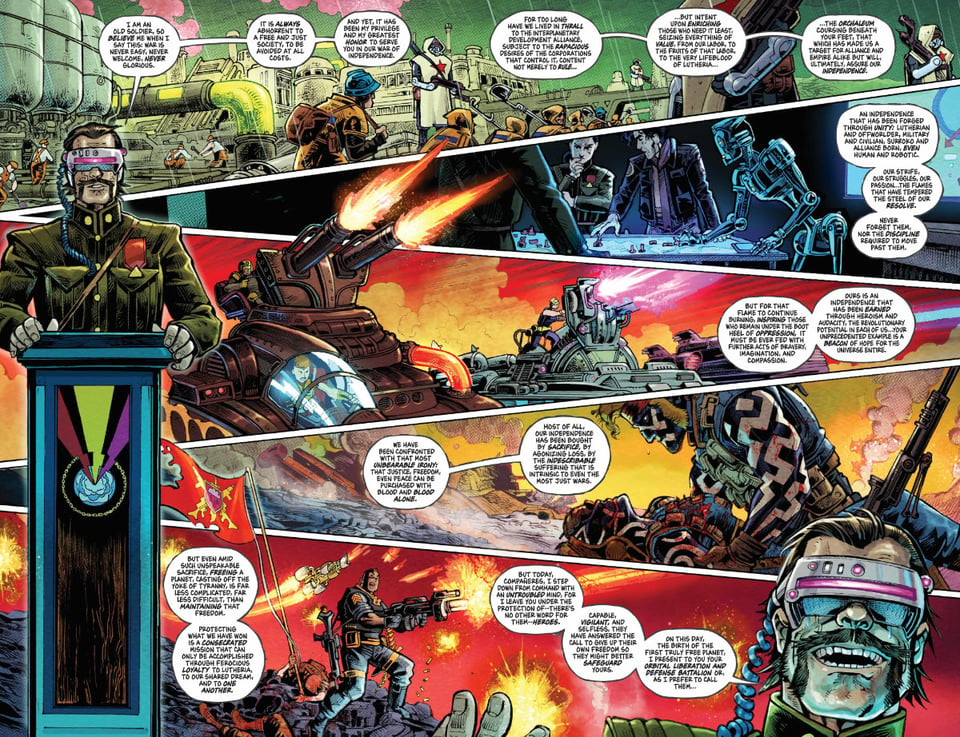
What's your hopes for the book? What do you hope people get from it? What does winning look like?
I want the length of Free Planet to be measured, not in issues, but in feet. A book that runs long enough for Jed and I to continue delving into our hyperspecific interests, with the end result of something that – perhaps counterintuitively – becomes universal not despite, but because of its aggressive idiosyncrasy and the fully developed verisimilitude fostered by it. More than anything though, I want Free Planet to prompt thought and discussion in the way that only truly complex and challenging work can.
Free Planet’s FOC is April 14th, so speak to your retailer before then. It’s out May 7th.
****
It’s the 20th year anniversary of the US office, which I came to about a decade late, and found it an interesting (if obvious) missing link in my own understanding of the American Sitcom. This is an oral history of the difficult first season by the writers. I love this kind of stuff.
Nick Cave’s Red Right Hand continues to be basically the closest I get to hearing a sermon. The latest is especially good, writing to a man conflicted between his family duties and his artist callings: “The creative urge is a gift not afforded to everyone, and those of us who possess it bear a responsibility to pursue that impulse wholeheartedly. However, there are other duties beyond those at the tip of your brush or nib of my pen – beautiful and sacrificial fidelities. You have committed to your wife and son to offer them more than just the crumbs of yourself, the dregs of what remains of you after a day with the devil in the shed.”
Excellent RPG organ Wyrd Science moves on from Substack, and writes about the Power Fantasy on the way out.
Becky Burke was released last week, and has released details on her story.
***
I’m going to keep this short, as if I get on top of a couple of hanging tasks in the last hour of work in the day, I can have a clearer run at tomorrow. Writing about The Slade Rule will have to wait.
The short of it work continues. I haven’t wrapped the next Stephanie script, but it’s an hour’s polish tomorrow morning away from going over to Katie. Stephanie is wrapping the previous script – it’s done, bar tweaks, and on a cover. The Power Fantasy #8 is at the printer. Caspar is at work on issue #9, and I suspect I’ll be starting on #10 next week. I’m vaguely kicking myself for starting all these quasi-journalistic things I’m doing now, as it’s all extra things to fit into the day. Yet here I am.
I also scheduled the next playtest of a design I’m noodling on, and actually happily writing things for it. It’s certainly reached a level of momentum of ideas which pleases me. I suspect it’ll soon reach the point where I need to write a bunch of content to fit into the design, at which point I’ll give up.
And with that, let me slump away from the keyboard. I am in the sun, and melting.
Speak soon.
Kieron Gillen
Bath
26.3.2025